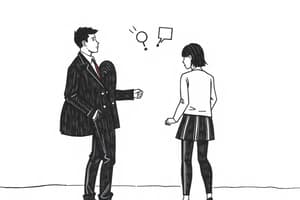Podcast
Questions and Answers
What is secondary deviance primarily a result of?
What is secondary deviance primarily a result of?
- Social reaction and labeling (correct)
- Genetic predisposition
- Economic hardship
- Personal choice
Who is associated with the concept of secondary deviance?
Who is associated with the concept of secondary deviance?
- Becker
- Lemert (correct)
- Durkheim
- Merton
What effect does negative labeling have on offenders according to labeling theory?
What effect does negative labeling have on offenders according to labeling theory?
- Pushes offenders towards a deviant career (correct)
- Makes them seek legal employment
- Encourages rehabilitation
- Reduces their desire to commit crimes
What is the deviance amplification spiral?
What is the deviance amplification spiral?
How did the Mods and Rockers exemplify the deviance amplification spiral?
How did the Mods and Rockers exemplify the deviance amplification spiral?
What term describes labeling an individual as a deviant and the subsequent actions confirming this identity?
What term describes labeling an individual as a deviant and the subsequent actions confirming this identity?
According to labeling theory, what should be avoided to reduce deviance?
According to labeling theory, what should be avoided to reduce deviance?
Which process can escalate deviance rather than reduce it?
Which process can escalate deviance rather than reduce it?
What term did Lemert use to describe the further deviance from acting out a label?
What term did Lemert use to describe the further deviance from acting out a label?
What is the primary concern of labelling theorists when they study rules?
What is the primary concern of labelling theorists when they study rules?
According to Becker, which factor is LEAST important in the creation of new laws?
According to Becker, which factor is LEAST important in the creation of new laws?
What does Cicourel's concept of 'typifications' primarily explain?
What does Cicourel's concept of 'typifications' primarily explain?
Which of the following factors is NOT a determinant of whether a person gets labelled?
Which of the following factors is NOT a determinant of whether a person gets labelled?
What is the difference between primary and secondary deviance according to Lemert?
What is the difference between primary and secondary deviance according to Lemert?
What does Cicourel suggest regarding the use of official crime statistics?
What does Cicourel suggest regarding the use of official crime statistics?
Which statement best summarizes Becker's argument about deviant behaviour?
Which statement best summarizes Becker's argument about deviant behaviour?
What did Cicourel find about middle-class youths who are arrested?
What did Cicourel find about middle-class youths who are arrested?
What role do moral entrepreneurs play, according to labelling theory?
What role do moral entrepreneurs play, according to labelling theory?
Which of the following statements best describes Braithwaite's concept of reintegrative shaming?
Which of the following statements best describes Braithwaite's concept of reintegrative shaming?
Why is labelling theory considered deterministic?
Why is labelling theory considered deterministic?
Which of these is a criticism of labelling theory?
Which of these is a criticism of labelling theory?
What is one positive outcome Braithwaite associates with reintegrative shaming?
What is one positive outcome Braithwaite associates with reintegrative shaming?
How does labelling theory propose to reduce crime?
How does labelling theory propose to reduce crime?
Which of the following statements contradicts labelling theory?
Which of the following statements contradicts labelling theory?
Which theoretical perspective criticizes labelling theory for ignoring power dynamics?
Which theoretical perspective criticizes labelling theory for ignoring power dynamics?
According to the criticisms of labelling theory, what does it fail to provide?
According to the criticisms of labelling theory, what does it fail to provide?
Which form of shaming attributes the offender with being a bad person?
Which form of shaming attributes the offender with being a bad person?
What is a policy implication derived from labelling theory?
What is a policy implication derived from labelling theory?
What can the initial attempt to control deviance lead to according to the deviance amplification spiral?
What can the initial attempt to control deviance lead to according to the deviance amplification spiral?
What is a possible outcome when an individual internalizes the deviant label according to Lemert?
What is a possible outcome when an individual internalizes the deviant label according to Lemert?
Which concept involves societal reaction leading to further deviant behavior by an individual?
Which concept involves societal reaction leading to further deviant behavior by an individual?
How does labeling theory propose society should respond to offenders?
How does labeling theory propose society should respond to offenders?
What theory is utilized to explain the escalating process where more control attempts lead to increased deviance?
What theory is utilized to explain the escalating process where more control attempts lead to increased deviance?
Which of the following is NOT a described process in the deviance amplification spiral?
Which of the following is NOT a described process in the deviance amplification spiral?
What does the labeling theory imply about the effect of 'naming and shaming' offenders?
What does the labeling theory imply about the effect of 'naming and shaming' offenders?
Which group is used as an example to illustrate the deviance amplification spiral?
Which group is used as an example to illustrate the deviance amplification spiral?
Which phenomenon describes the increase in deviant behavior after initial minor acts are controlled by societal reaction?
Which phenomenon describes the increase in deviant behavior after initial minor acts are controlled by societal reaction?
Which of the following best explains the concept of reintegrative shaming?
Which of the following best explains the concept of reintegrative shaming?
Which major criticism of labelling theory implies it ignores the proactive choices of individuals?
Which major criticism of labelling theory implies it ignores the proactive choices of individuals?
According to the criticisms, which key aspect related to the creation of deviance does labelling theory fail to analyze?
According to the criticisms, which key aspect related to the creation of deviance does labelling theory fail to analyze?
Which of the following is an implication of the deterministic nature of labelling theory?
Which of the following is an implication of the deterministic nature of labelling theory?
What does labelling theory imply would happen if deviant labels did not exist?
What does labelling theory imply would happen if deviant labels did not exist?
Braithwaite's concept of reintegrative shaming differs from disintegrative shaming primarily in which way?
Braithwaite's concept of reintegrative shaming differs from disintegrative shaming primarily in which way?
What is a major drawback of labelling theory's focus on the negative effects of labelling?
What is a major drawback of labelling theory's focus on the negative effects of labelling?
Which of the following statements best summarizes a criticism regarding the explanation of primary deviance in labelling theory?
Which of the following statements best summarizes a criticism regarding the explanation of primary deviance in labelling theory?
Which of the following does ‘disintegrative shaming’ involve?
Which of the following does ‘disintegrative shaming’ involve?
For labelling theorists, what is the most significant consequence of negative labelling?
For labelling theorists, what is the most significant consequence of negative labelling?
According to Becker, what is the result of the creation of a new law?
According to Becker, what is the result of the creation of a new law?
What factor most influences whether a person is arrested and charged?
What factor most influences whether a person is arrested and charged?
What does Cicourel mean by 'the negotiation of justice'?
What does Cicourel mean by 'the negotiation of justice'?
What is the main implication of Cicourel's study on official crime statistics?
What is the main implication of Cicourel's study on official crime statistics?
How does Lemert differentiate between primary and secondary deviance?
How does Lemert differentiate between primary and secondary deviance?
What role do social control agencies play in the social construction of crime, according to Becker?
What role do social control agencies play in the social construction of crime, according to Becker?
What does Cicourel identify as a primary influence on police officers' law enforcement actions?
What does Cicourel identify as a primary influence on police officers' law enforcement actions?
How does the concept of 'moral entrepreneurs' contribute to the creation of new laws?
How does the concept of 'moral entrepreneurs' contribute to the creation of new laws?
What challenge does Cicourel's finding on justice negotiability pose to legal equality?
What challenge does Cicourel's finding on justice negotiability pose to legal equality?
Flashcards are hidden until you start studying
Study Notes
Deviance Amplification
- Deviance amplification spiral: attempts to control deviance lead to an increase in deviance, resulting in more attempts to control deviance, creating a cycle.
Labeling Theory
- Beaumont B. Lemert referred to secondary deviance as the result of social reaction, leading to a self-fulfilling prophecy.
- Deviant behavior is behavior that people label as such, according to Howard Becker.
- Labeling theory focuses on how and why rules are made, particularly the role of moral entrepreneurs.
- Moral entrepreneurs lead a moral crusade to change the law, believing it will benefit those it applies to.
Social Construction of Crime
- Labeling theorists argue that it's not the inherent harmfulness of a behavior that leads to new laws, but rather the efforts of powerful individuals and groups to redefine that behavior as unacceptable.
- Social control agencies may campaign for a change in the law to increase their own power.
Who Gets Labeled?
- Factors influencing whether someone is arrested, charged, and convicted include interactions with agencies of social control, appearance, background, and personal biography, and situation and circumstances of the offense.
Cicourel's Research
- Cicourel found that police officers' typifications (common sense theories or stereotypes) led them to concentrate on certain 'types', resulting in a class bias in law enforcement.
- Officers' typifications resulted in working-class areas and people being targeted more frequently.
- Cicourel argues that justice is not fixed, but negotiable.
Implications of Cicourel's Study
- Official crime statistics do not give a valid picture of crime patterns and should be treated as a topic for sociologists to investigate.
Effects of Labeling
Primary and Secondary Deviance
- Primary deviance refers to deviant acts that have not been publicly labeled.
- Secondary deviance is the result of societal reaction, or labeling, which can lead to a self-fulfilling prophecy.
Evaluating Labelling Theory
- Criticisms of labeling theory include that it is deterministic, ignores the real victim of the crime, and fails to explain why people commit primary deviance in the first place.
- It also implies that deviance would not exist without labeling and neglects the source of power in creating deviance.
Deviance Amplification
- Deviance amplification spiral: attempts to control deviance lead to an increase in deviance, resulting in more attempts to control deviance, creating a cycle.
Labeling Theory
- Beaumont B. Lemert referred to secondary deviance as the result of social reaction, leading to a self-fulfilling prophecy.
- Deviant behavior is behavior that people label as such, according to Howard Becker.
- Labeling theory focuses on how and why rules are made, particularly the role of moral entrepreneurs.
- Moral entrepreneurs lead a moral crusade to change the law, believing it will benefit those it applies to.
Social Construction of Crime
- Labeling theorists argue that it's not the inherent harmfulness of a behavior that leads to new laws, but rather the efforts of powerful individuals and groups to redefine that behavior as unacceptable.
- Social control agencies may campaign for a change in the law to increase their own power.
Who Gets Labeled?
- Factors influencing whether someone is arrested, charged, and convicted include interactions with agencies of social control, appearance, background, and personal biography, and situation and circumstances of the offense.
Cicourel's Research
- Cicourel found that police officers' typifications (common sense theories or stereotypes) led them to concentrate on certain 'types', resulting in a class bias in law enforcement.
- Officers' typifications resulted in working-class areas and people being targeted more frequently.
- Cicourel argues that justice is not fixed, but negotiable.
Implications of Cicourel's Study
- Official crime statistics do not give a valid picture of crime patterns and should be treated as a topic for sociologists to investigate.
Effects of Labeling
Primary and Secondary Deviance
- Primary deviance refers to deviant acts that have not been publicly labeled.
- Secondary deviance is the result of societal reaction, or labeling, which can lead to a self-fulfilling prophecy.
Evaluating Labelling Theory
- Criticisms of labeling theory include that it is deterministic, ignores the real victim of the crime, and fails to explain why people commit primary deviance in the first place.
- It also implies that deviance would not exist without labeling and neglects the source of power in creating deviance.
Studying That Suits You
Use AI to generate personalized quizzes and flashcards to suit your learning preferences.




